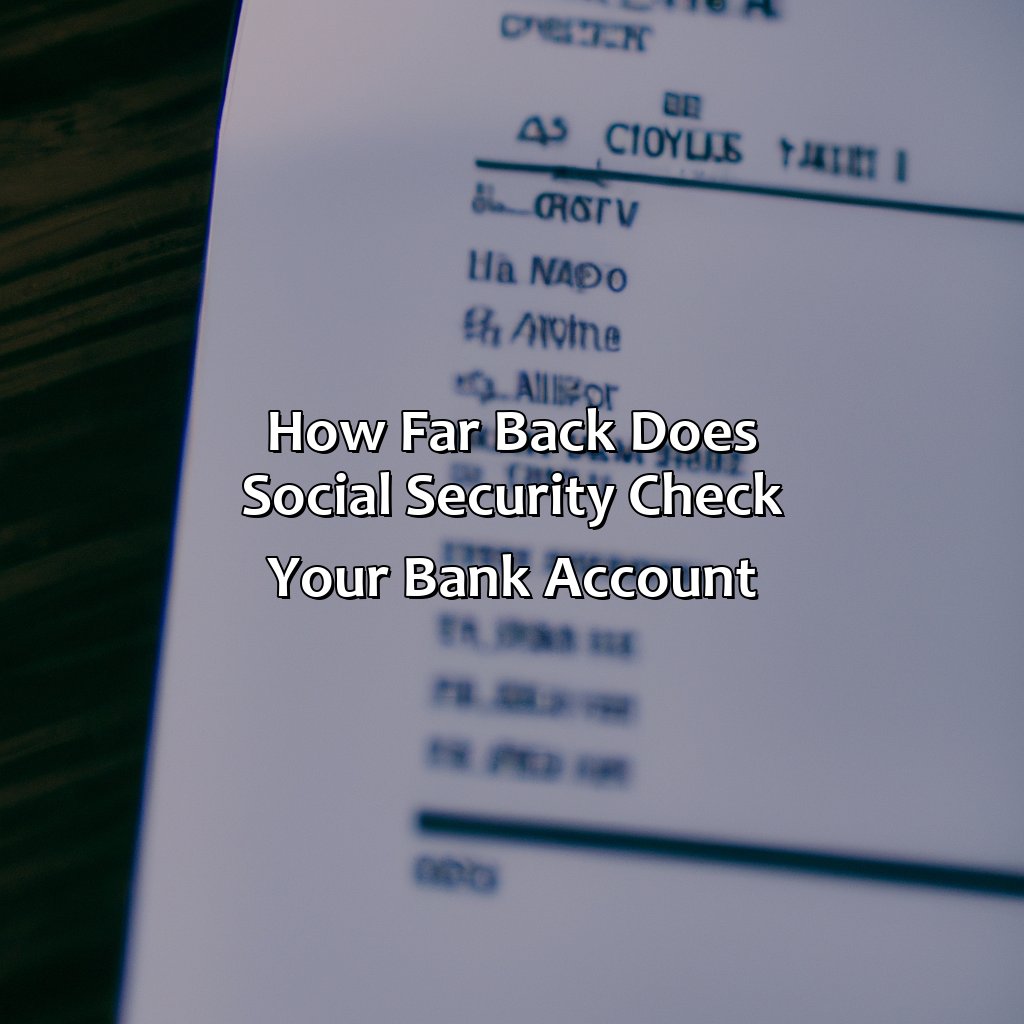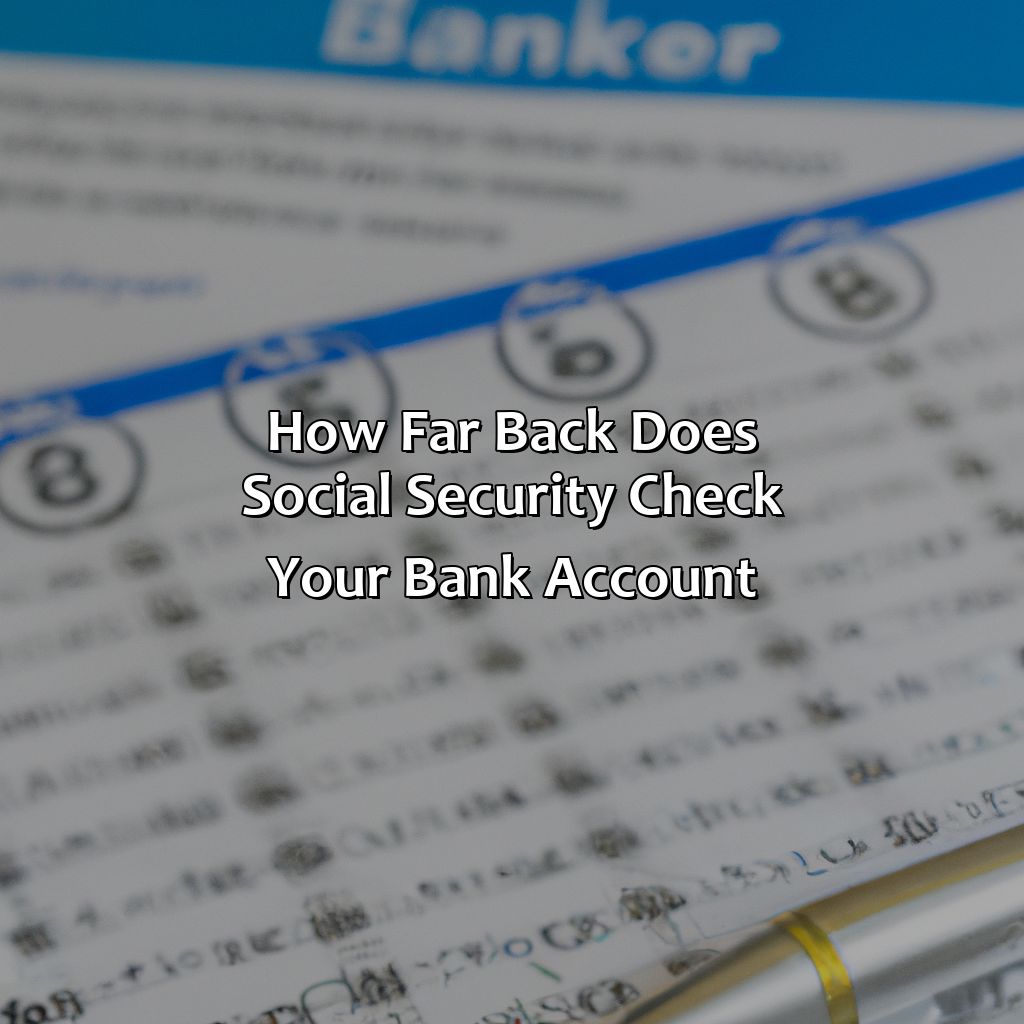How Far Back Does Social Security Check Your Bank Account?
Key Takeaway:
- Social Security may look at your bank account as far back as the date you applied for benefits. They have the legal authority to do so in order to determine your eligibility and benefit amount.
- The time frame for which Social Security checks your bank account can vary depending on individual factors such as your financial situation and the type of benefits you receive.
- Social Security is primarily interested in determining if you have any unreported income or resources that could affect your eligibility or benefit amount. Failure to report these can result in penalties or even criminal prosecution.
Do you worry about Social Security snooping into your bank account? If so, this blog will provide an in-depth look at how far back Social Security can check your records. We’ll discuss what Social Security looks for and how to prepare for potential audits. You can protect your privacy and secure your finances today.
How Far Back Does Social Security Check Your Bank Account?
Do you want to know how far back Social Security can check your bank account? Here’s a guide to help you. Social Security has the power to check accounts. However, how far back they can go depends on different variables. Learn more about Social Security’s authority and the factors that impact how far back they can check in the sub-sections below!

Image credits: retiregenz.com by David Jones
Social Security’s Authority to Look at Bank Accounts
Social Security has the lawful right to scrutinize bank accounts of individuals who receive benefits. The agency has been authorized by law, namely the Social Security Act, to access and examine financial records from banks without consent to verify eligibility. This inspection is done to prevent fraud and abuse.
In most cases, Social Security examines account information for a maximum of six months before the application date or claim filing date. This duration may be longer if there are reasonable grounds that justify it, such as complex financial transactions or lack of sufficient evidence for eligibility.
It’s good practice to report any significant changes in income or assets right away to avoid raising red flags during inspections. Avoid depositing money meant for things other than basic necessities into your account when you’re receiving benefits. Opting for direct deposit instead of paper checks helps safeguard privacy and security while also expediting payments.
By promptly reporting changes in financial circumstances and avoiding questionable deposits, applicants can protect their Social Security benefits from being frozen pending investigation. Keeping a transparent and accurate record of bank transactions is vital to preventing unintentional or fraudulent misuses of government-issued funds.
Social Security checks your bank account history like a private investigator, but with less drama and more math.
Factors That Affect How Far Back Social Security Can Check
Social Security checks bank accounts to determine eligibility for benefits, and the duration of this process depends on multiple factors. Primarily, the agency examines previous years’ bank statements ranging from three months to a few years, with some situations requiring further inquiry.
Depending on the reason for reviewing the bank account, Social Security may look back further than usual. For instance, if they suspect fraudulent activity or abuse in claiming benefits, the agency may review up to ten years of banking records. Additionally, applicants receiving non-Social Security income might have their accounts reviewed for verification purposes.
It is important to note that while Social Security has the authority to access financial information during an investigation, individuals retain their privacy rights under federal law. Therefore, all relevant parties must give written consent before such information is shared.
A widely-known case involving a Texas woman proves the significance of adhering to rules regarding bank account disclosure. In 2012, she was sentenced to three years in federal prison for illegally acquiring $140k in disability payments after feigning blindness for over a decade. Social Security officers caught her when a routine fraud check revealed that she was active on social media with images and comments indicating perfect eyesight. The investigation uncovered that she had been depositing undisclosed sources of income into her account and purchasing luxury items beyond her means- all while collecting thousands in disability benefits monthly.
Looks like Social Security is the ultimate snooping ex who wants to know every penny you’ve spent and every latte you’ve splurged on.
Will Social Security Find Everything in Your Bank Account?
To grasp how Social Security might explore your bank accounts, you can examine the subsections of ‘Will Social Security Find Everything in Your Bank Account?’ These include:
- ‘What Social Security is Looking for in Bank Statements’
- ‘What Happens If Social Security Finds Money You Didn’t Report?’
These can be beneficial in understanding.

Image credits: retiregenz.com by David Jones
What Social Security is Looking for in Bank Statements
Social Security scrutinizes bank statements to detect unreported income, which is the primary reason for benefit overpayments. They also check for cash withdrawals that exceed SSI resource limits and non-eligible expenses. Understanding Social Security’s criteria for reviewing bank statements is crucial in avoiding benefit suspension and repayment requests.
Looks like Social Security is the ultimate snitch, finding money in your bank account that you didn’t even know was there!
What Happens If Social Security Finds Money You Didn’t Report?
Social Security has access to bank accounts and is always on the lookout for unreported income or assets. If they find any, they will take action, which may result in paying back everything you owe with interest and penalties. In addition, you could risk losing Social Security benefits or even face legal consequences such as fines or imprisonment.
It’s important to report all of your income and assets to Social Security accurately and on time. Failure to do so could have severe consequences. Social Security checks bank accounts up to five years back, so any unreported income detected within that period will be discovered.
Furthermore, it’s crucial to keep proper documentation of all financial transactions and report any changes in a timely manner. This includes fluctuations in income, significant changes in savings or investments, or any inherited amounts.
One woman found herself in trouble with Social Security when she failed to report a lump sum severance payment she received from her previous employer. This resulted in an overpayment of benefits by several thousand dollars, which she had to repay in full with additional interest and penalties. It’s always better to be safe than sorry when reporting finances to the government agency responsible for administering social security benefits.
Five Facts About How Far Back Social Security Checks Your Bank Account:
Social Security may check your bank account for up to the past two years of transactions. (Source: Investopedia)
The Social Security Administration typically only checks bank account activity if they have reason to believe fraud or misuse of funds may have occurred. (Source: The Balance)
Social Security may also check your bank account if you have a representative payee managing your benefits. (Source: Social Security Administration)
The frequency of bank account checks by the Social Security Administration varies depending on individual circumstances. (Source: Nolo)
The Social Security Administration must abide by strict rules when accessing an individual’s bank account information. (Source: Consumer Financial Protection Bureau)
FAQs about How Far Back Does Social Security Check Your Bank Account?
How far back does Social Security check your bank account?
Social Security Administration can check your bank account for any irregularities as far back as six years.
Why does Social Security check bank accounts?
Social Security checks bank accounts to ensure that beneficiaries are using their benefits for their intended purposes and to prevent fraudulent activities such as receiving benefits while still being employed.
Is it legal for Social Security to check your bank account?
Yes, Social Security is legally allowed to check your bank account as part of their duty to protect the integrity of their programs and prevent fraud.
Do I have to give Social Security permission to check my bank account?
No, you do not have to give them permission as they have the legal authority to conduct bank account checks under federal law.
What happens if Social Security finds irregularities in my bank account?
If Social Security discovers any irregularities in your bank account, they may investigate further and take actions such as suspending or interfering with your benefits, initiating legal proceedings, or imposing penalties and fines.
Can I appeal the decision made by Social Security based on their bank account checks?
Yes, you have the right to appeal any decision made by the Social Security Administration. You can request an appeal in writing within 60 days of the decision.
 Checkout this IRS Loophole
Checkout this IRS Loophole 
